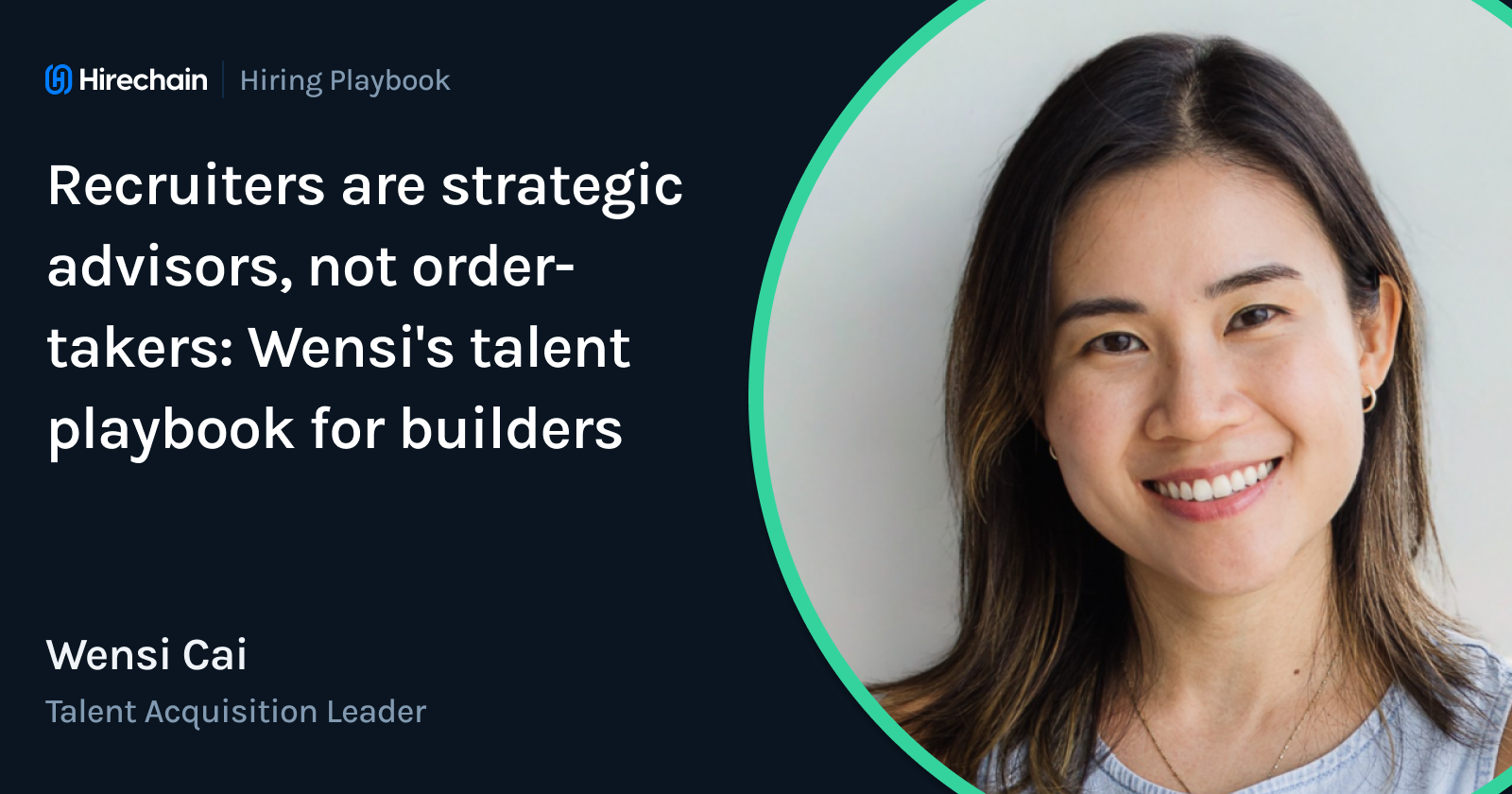Meet Wensi Cai

Wensi Cai has spent over a decade building and scaling talent functions across frontier tech companies. She's one of the few people who intentionally chose recruiting as a career, not by accident. She led a 10-person APAC recruiting team at Meta, scaled leadership hiring at a major Web3 exchange, and worked closely with founders at hyper-scale startups like Grab.
Core belief: Recruiters should be strategic advisors, not order-takers. The best talent teams don't just fill roles, they shape hiring strategy, understand team dynamics, and push back when requirements are too narrow.
Key Takeaways
Challenge hiring requirements, systematically
Most hiring managers default to "someone who's done this exact job before." Wensi's first question:
"If they've done the exact same job, why would they want to do it again?"
People join new companies to grow, not repeat. When teams insist on exact background matches, they're often hiring for comfort, not competence.
Her framework:
- Ask: What problems does this person need to solve?
- Find parallel experiences in adjacent industries
- Look for passion and curiosity over perfect résumé fit
- Reframe requirements around transferable skills, not titles
"People tend to look for talent that have done the exact same scope, held the exact same title in another company, come from the exact same industry."
Example: A Singapore CEO role initially required Major Payment Institution (MPI) license experience—only about 20 people in Singapore had that. Wensi reframed it: "What problems do you expect this person to solve?" The answer: navigating regulatory environments in disruptive industries. She found a candidate from ride-sharing who'd worked closely with government authorities to pave regulatory paths. The candidate had a Web3 book by their bedside and was looking for an entry point. Perfect fit.
Action for founders:
Before you write a job description, ask: "What's the problem this person solves?"
Then look for who's solved similar problems elsewhere, even if their title doesn't match.
Spend more time prepping candidates than screening them
Most recruiters treat interviews as pure assessment. Wensi flips it: prep candidates like your success depends on their performance, because it does.
She learned this at Meta, where structured interview processes and clear evaluation criteria meant candidates needed thorough preparation to succeed.
"I would spend more time prepping a candidate than asking screening questions."
Why preparation matters:
- Candidates have limited time to showcase achievements
- Structured interviews have clear signals to collect, help candidates hit them
- Confidence-building is part of candidate experience
- Great talent evaluates you as much as you evaluate them
Her prep approach:
- Walk candidates through the interview structure and what to expect
- Clarify evaluation criteria and what "good" looks like
- Help them frame their stories to hit key signals
- Build confidence so they show up as their best selves
Action for founders:
Don't just assess, prepare. Treat candidate prep as a competitive advantage. Great candidates remember how you made them feel, and they'll choose teams that invest in their success.
Build teams for complementary strengths, not checkbox qualifications
Wensi doesn't hire for individual perfection. She hires for team balance.
"It's so silly to just look for someone who checks all the boxes. It's absolutely okay for someone to have growth areas. The team itself can be a powerhouse."
Her team-building philosophy:
- Assess team strengths and weaknesses as a whole
- Look for people who fill gaps, not duplicate skills
- Growth areas are fine if the team can support them
- Complementary skills > identical backgrounds
Example: A team wanted to backfill a role at the same level. Wensi reviewed the exit interview, the person left because the scope was too small. She convinced them to hire one level lower, giving the new hire room to grow into the role. Better fit, better retention.
Action for founders:
Map your team's collective strengths and weaknesses. Then hire for what's missing, not for what feels safe.
Founders must drive recruitment culture
At the best companies, founders don't delegate talent, they own it.
Wensi saw this firsthand working with hyper-growth founders who treated talent acquisition as a strategic function, not an HR task.
What great founder involvement looks like:
- Monthly reviews of market and competitor talent insights
- Active engagement in shaping hiring strategy by business area
- Direct feedback on target candidates and requirements
- Treating talent acquisition as part of the leadership team
"At one company, we had monthly competitor insights sharing. The founders would comment on everything, ask a lot of questions. We'd go down the list of which talent from competitors we wanted to approach."
What doesn't work:
Founders who treat recruiting as a service function. Founders who rubber-stamp requirements without challenging them. Founders who check in only when a role isn't filled fast enough.
Action for founders:
Block time monthly to review talent strategy. Ask: Who are we losing to? What skills are we missing? Where should we be hunting talent? Make recruiting a leadership priority, not an operational afterthought.
Measure quality, not just velocity
Most recruiting teams track offer acceptance rates, time-to-fill, and pipeline metrics. Wensi cares about one thing: Did this hire move the business forward?
"The way we measure talent success is a lot about talent acquisition metrics that don't necessarily align with business metrics. We don't talk about how it moves the company forward or the quality of the talent."
Her north star metrics:
- Talent quality (retention, performance, impact)
- Business outcomes (did the hire unlock new capabilities?)
- Team dynamics (did they make the team stronger?)
What she tracks less:
- Offer acceptance rates (vanity metric)
- Funnel conversion (process metric, not outcome)
- Time in stage (speed matters, but quality matters more)
Action for founders:
Stop measuring recruiting success by how many offers you send. Start measuring by whether your hires are still crushing it 12 months later.
AI frees recruiters to be strategic
Wensi is optimistic about AI, not because it replaces recruiters, but because it frees them to do the work that matters.
"AI finally frees us from all this admin by automating a lot of the processes, so we can actually focus on the more strategic part of talent."
What AI should handle:
- Resume screening and initial filtering
- Interview scheduling and logistics
- Candidate communication and updates
- Data tracking and reporting
What recruiters should focus on:
- Relationship-building with hiring managers
- Understanding team dynamics and needs
- Shaping hiring strategy and requirements
- Candidate experience and preparation
Action for founders:
Don't use AI to replace talent teams. Use it to free them from admin so they can actually be strategic advisors.
Metrics that matter
Early-stage (pre-50 people):
- Are candidates excited about the problem or just the comp?
- Do your best people refer others without being asked?
- Can you close candidates in 2–3 weeks max?
Growth stage (50–200 people):
- Retention at 12 months (quality of hire)
- Time from role open to business impact (not just offer accepted)
- Percentage of hires who elevate team culture
Team health indicators:
- Referral quality and conversion
- Hiring manager satisfaction with candidates
- Candidate NPS and experience scores
Key takeaways
✅ Challenge requirements before filling them. The best recruiters push back, reframe, and broaden talent pools.
✅ Candidate prep is your competitive edge. Great talent remembers how you made them feel in the process.
✅ Hire for team balance, not individual perfection. Growth areas are fine if the team can support them.
✅ Founders own talent strategy. Recruiting isn't an HR function, it's a leadership priority.
✅ Measure impact, not activity. Success isn't filling roles fast, it's hiring people who move the business forward.
Pro tips
💡 Passion beats pedigree in frontier tech. Wensi found a Singapore CEO who had a Web3 book by their bedside—no direct crypto experience, but
deep curiosity and adjacent skills. That curiosity is hard to fake and easy to spot.
💡 Reframe narrow requirements with one question: "What problem does this person solve?" Then hunt for people who've solved similar problems in different contexts.
💡 If your team isn't referring people, fix culture first. No one refers to a place they don't believe in. Referrals are a culture metric, not a pipeline tactic.
💡 AI should automate admin, not strategy. Use it to free recruiters to focus on relationships, not replace their judgment.
Need help hiring crypto talent? Post a job on Hirechain for free and get pre-qualified candidates that are worth your time.



